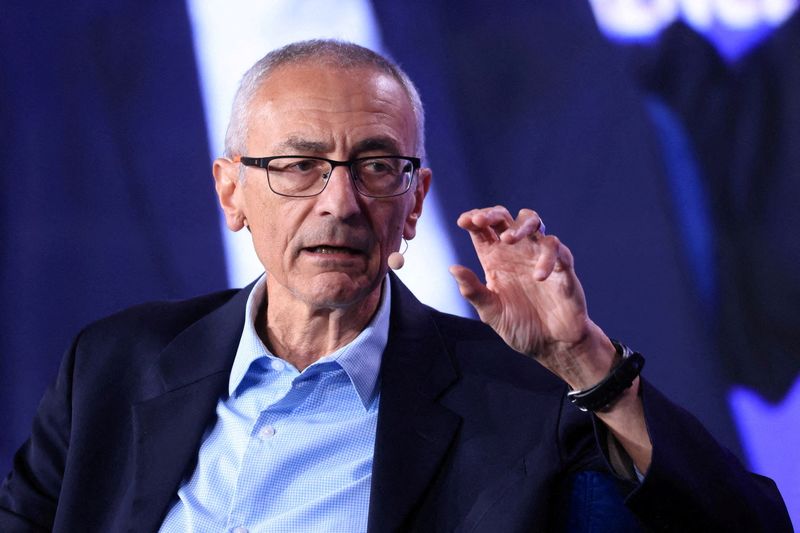
By David Stanway
SINGAPORE (Reuters) – The outcome of November’s presidential election will loom large over talks in Beijing this week between U.S. climate envoy John Podesta and his Chinese counterpart Liu Zhenmin, experts said on Wednesday.
Co-operation between the world’s two biggest greenhouse gas emitters has helped pave the way for major climate deals, such as the 2015 Paris Agreement, but the risk of former President Donald Trump’s re-election could make fresh pledges difficult.
“The election will make it very hard – in fact, impossible – for the two sides to reach any substantive agreement during Podesta’s trip,” said Li Shuo, an expert in climate diplomacy at the Asia Society Policy Institute.
“There’s just no reason why the China side will show its cards ahead of the election.”
With Podesta set to arrive in Beijing on Wednesday, the United States also hopes to press China to contribute to a new global climate finance package and set more ambitious 2035 goals before a U.N. deadline early next year.
China’s foreign ministry declined to comment on the visit.
During Trump’s first term in office, starting in 2017, the United States shut down climate talks with China and withdrew from the Paris Agreement. Though it rejoined in 2021, Trump is expected to pull out again if he wins in November.
However, the entry of Kamala Harris to the fray means Beijing’s calculations will be different from a few months ago, when most polls showed Trump leading over President Joe Biden, said Tom Evans, senior policy adviser with the E3G climate think tank.
“China is going to have to entertain the possibility of two very different U.S. scenarios and hedge their bets,” he said, after the vice president took Biden’s place on the Democratic ticket.
Washington is said to be pushing Beijing to pledge an emissions cut of 30% by 2035 to align with the Paris Agreement, and regardless of November’s result, Evans said, it was still key for the United States to spur China to raise its ambitions.
Even a Trump win could afford China an opportunity to show more ambition and “distinguish itself positively from a backsliding United States”, he added.

Yet a victory for Trump would doom two-way climate diplomacy, said Li, who is also the director of the China Climate Hub at the Asia Society Policy Institute.
“It will be very clear-cut: climate is just not an issue and there won’t be any U.S.-China climate engagement from day one.”
This post is originally published on INVESTING.




